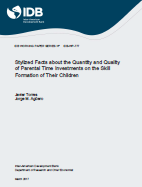Stylized Facts about the Quantity and Quality of Parental Time Investments on the Skill Formation of Their Children
Date
Mar 2017
This paper uses seven nationally representative time use surveys in Latin America to identify key stylized facts regarding the quantity and quality of parental time investment on the skill formation of their children. Traditional models of household behavior have failed to account for the differential behavior of parents with respect to skill formation of their children vis-à-vis home production. This paper finds that, similarly to higher-income countries, there is a positive education gradient, as more educated parents spend more time on skill formation than their less educated counterparts. This pattern is observed across all countries. The paper further extends this literature by showing that more educated parents also provide better care for their children, thus increasing the socioeconomic gap.




